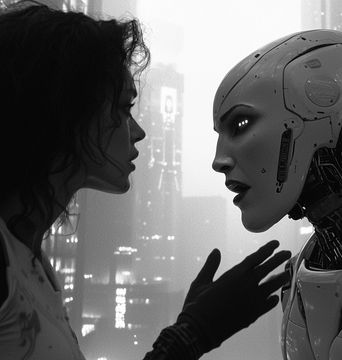VOICE ACTOR ASHLY BURCH ALARMED OVER SONY'S AI EXPERIMENT REPLACING HUMAN PERFORMERS!

Ashly Burch, prominent voice and performance actor, known for her role as Aloy in Horizon Zero Dawn, made headlines recently when she voiced her concerns regarding a leaked Sony experiment. This experiment saw the iconic character she portrays voicing lines through artificial intelligence, devoid of Burch's talent and instead relying on AI technology. Although it’s worth noting the experiment was not advancing further and did not use Burch's voice or facial data, the occurrence was sufficient to spark a discourse on the future of game performance craft and the impact of AI on the industry.
The award-winning actress, also known for her roles in games such as The Last of Us Part II, Spider-Man, and Life Is Strange, emphasized her concerns not against the technology nor towards game companies eager to integrate AI. Instead, her worries stem from the lack of agreement from her bargaining group to secure common sense protections for the actors.
The role of AI in the video game industry and entertainment sector at large is on a path of rapid expansion. While it promises novel gaming experiences and functions to reduce costs associated with hiring human actors, it simultaneously poses significant challenges triggered by the potential loss of jobs and threats to the art into which actors like Burch pour their life and soul.
The Screen Actors Guild‐American Federation of Television and Radio Artists (SAG-AFTRA), the union with which Burch is affiliated, is currently on strike against this threat to performance artists in the video gaming industry. They are demanding appropriate measures - including the consent of the actors before their AI equivalents are made, fair compensation, and transparency with respect to how their AI versions are used.
As the video game industry continues to evolve and incorporate advanced technologies, such instances raise critical questions about the ethics and the boundaries of AI use in creative domains. Many worry that AI, replacing the need for human actors, could diminish the importance of the human touch that brings life to characters, thereby diluting the essence of game performance as an art form.
These concerns don't just affect actors in the gaming industry, but could have far-reaching implications for various fields of entertainment. If this increasing usage of AI is not regulated, traditional acting could fade into oblivion, threatening entire trades and livelihoods while morphing the entertainment landscape.
Burch's advocacy for her profession underlines the need for comprehensive dialogues and regulations on AI usage in the gaming industry and entertainment in general. As the technology continues to advance, perhaps one way to preserve the integrity of performance artistry is to strike a balance where AI is used to elevate human performance, not replace it. This echoes Burch's sentiments, affirming that the problem isn't entirely with the technology itself, but with ensuring reasonable safeguards in its use, such that the human element driving the art form is sustained and cherished.
As the narrative unfolds, all eyes will be on the evolution of AI within the gaming industry and how stakeholders will ultimately navigate this technological disruption to protect the essence of their craft. Needless to say, the choices made today will have a profound impact on the future of the entertainment industries. The battle lines have been drawn — marking another crucial juncture in the ongoing dialogue between humans and ever-evolving AI.